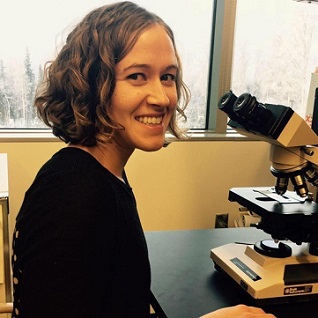Holly A. Martinson, PhD

Education
- Post Doctoral, Alaska Native Cancer Disparities, University of Alaska Anchorage, 2016
- Ph.D., Cancer Biology, University of Colorado Anschutz Medical Campus, 2014
- B.S. Chemistry, University of Alaska Anchorage, 2008
Teaching Responsibilities
- MD 610 Molecular Basis of Disease
- MD 620 Invaders and Defenders
- MD 640 Blood and Cancer
- MD 670 Lifecycle
- MD 692 Research Methods
- BIOM 692 Biomedical Seminar
- BIOL/CHEM 498 Individual Research
- BIOL/CHEM 499 Senior Thesis
Professional & Department Service
- Chair, UAA Middle College Programs
- Career and Research Mentor for the NIH BUILD EXITO program, UAA
Research Interests
The tumor microenvironment is a complex cellular environment made up of cancer cells, blood vessels, immune cells, signaling molecules, and extracellular matrix. Immune cells present within the microenvironment can affect the growth and metastatic spread of cancerous cells. In cancer patients with solid malignancies, one particular immune cell type, the myeloid cell, has been shown to be associated with poor prognosis. The overall goal of my lab’s research is to better understand the complex tumor microenvironment to develop novel preventive and therapeutic strategies to improve cancer patient outcomes. Our lab is currently working towards identifying ways to reprogram the immune suppressive myeloid cells into an immune stimulatory phenotype with the potential to enhance cancer immunotherapy response.
Our lab is also interested in understanding cancer health disparities in the Alaska Native people. There are certain cancers among the Alaska Native people, such as gastric and nasopharyngeal cancer, that occur at a higher incidence and have higher mortality rates. The ultimate goal of our research is to better understand the clinical, pathological, and molecular characteristics of these cancers as well as treatment response and clinical outcomes in order to reduce cancer incidence and improve patient outcomes. This work is in partnership with Matthew Olnes, M.D. Ph.D, the Director of Hematology and Medical Oncology at the Alaska Native Medical Center.
Publications
- Fitzgerald E, Murphy S, Martinson HA. Alpha-Synuclein Pathology and the role of the Microbiota in Parkinson’s disease. Frontiers in Neuroscience. 2019 Apr 1; Epub
- Francian A, Namen S, Madigan Stanley, Mann K, Martinson H, Kullberg M. Intratumoral delivery of antigen with complement C3-bound liposomes reduces tumor growth in mice. Nanomedicine. 2018 Nov 9; Epub. PMID: 30419362
- Pennock NA*, Martinson HA*, Guo Q, Betts CB, Jindal S, Tsujikawa T, Coussens LM, Borges VB, Schedin PJ. Ibuprofen supports macrophage differentiation, T cell recruitment, and tumor suppression in a model of postpartum breast cancer. Journal of ImmunoTherapy of Cancer. 2018 Oct 1; 6 (1): 98. PMID: 30285905 * these authors contributed equally
- Martinson HA, Alberts SR, Shelby NJ, and Olnes M. Gastric Cancer in Alaska Native people: A Cancer Health Disparity. World Journal of Gastroenterology. 2018 Jul 7; 24(25): 2722-2732. PMID: 29991877
- Kullberg M, Martinson H, Mann K, Anchordoquy TJ. Complement C3 mediated targeting of liposomes to granulocytic myeloid derived suppressor cells. Nanomedicine. 2015 Aug 31; 11(6): 1355-1363. PMID: 25839391
- Martinson HA, Jindal S, Durand-Rougely C, Borges V, and Schedin P. Wound healing-like immune program facilitates postpartum mammary gland involution and tumor progression. International Journal of Cancer. 2015 Apr 15; 136(8): 1803-13. PMID: 25187059
- Lyons TR, Borges VF, Betts C, Guo Q, Kapoor P, Martinson HA, Jindal S, and Schedin P. Cyclooxygenase-2-dependent lymphangiogenesis promotes nodal metastasis of postpartum breast cancer. Journal of Clinical Investigation. 2014 Sep 2; 124(9): 3901-3912. PMID: 25133426
- Fornetti J, Martinson HA, Betts CB, Lyons TR, Jindal S, Guo Q, Coussens LM, Borges VF, and Schedin P. Mammary gland involution as an immunotherapeutic target for postpartum breast cancer. Journal of Mammary Gland Biology and Neoplasia. 2014 Jul; 19(2): 213-28. PMID: 24952477
- Martinson HA, Lyons T, Giles E, Borges V, and Schedin P. Developmental windows of breast cancer risk provide opportunities for targeted chemoprevention. Experimental Cell Research. 2013 May 9; PMID: 23664839
- Lee-Sherick AB, Eisenman KM, Sather S, McGranahan A, Armistead PM, McGary CS, Hunsucker SA, Schlegel J, Martinson H, Cannon C, Keating AK, Earp HS, Liang X, DeRyckere D, and Graham DK. Aberrant Mer receptor tyrosine kinase expression contributes to leukemogenesis in acute myeloid leukemia. Oncogene. 2013 Mar 11; PMID: 23474756
- Fornetti J, Martinson H, Borges V, Schedin P Emerging targets for the prevention of pregnancy-associated breast cancer. Cell Cycle. 2012 Feb 15; 11(4): 639-40. PMID: 22374663
- O’Brien J, Martinson H, Durand-Rougely C, and Schedin P Macrophages are critical for epithelial cell death and adipocyte repopulation during mammary gland involution. Development. 2012 Jan; 139(2): 269-75. PMID: 22129827
- Maller O, Martinson H, and Schedin P. Extracellular matrix composition reveals complex and dynamic stromal-epithelial interactions in the mammary gland. Journal of Mammary Gland Biology and Neoplasia. 2010 Sep; 15(3):301-18. PMID: 20811805
Career History/Work Experience
- Associate Professor, WWAMI School of Medical Education, University of Alaska Anchorage, 2016-present
- Research Assistant, ASET Laboratory, University of Alaska Anchorage, 2006-2008









